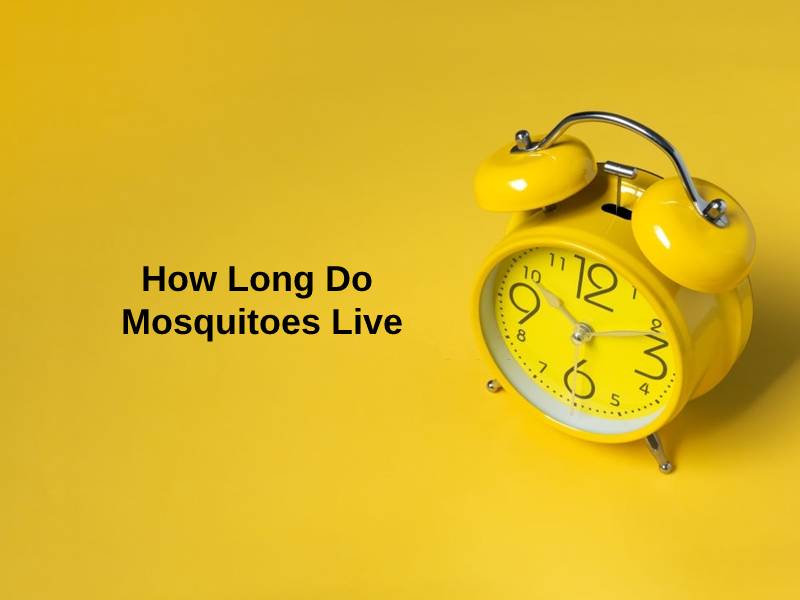Exact Answer: Less than 2 month
The scientific name of the mosquito is Culiseta longiareolata. It belongs to the Culicidae family. The family Culicidae contains 36,00 species of small flies. These are very common flying insects that are found in most parts of the world. More than 35,00 species of mosquito species are found so far.
The body of a mosquito is segmented. It has one pair of wings, three pairs of legs, and elongated mouthparts. The hair-like extensions present are called the legs of mosquitoes. The key parts of a mosquito’s body are the head, thorax, and abdomen.
It is believed that all mosquitoes bite humans and animals. But this is not the case. The most common reaction to a mosquito’s bite is swelling and itching. Many mosquitoes act as vectors. Vectors are insects or animals that carry pathogens.

How Long Do Mosquitoes Live?
The average lifespan of a mosquito is less than two months. Most of the mosquitoes come out during summer. Mosquitoes are also of different types. Different mosquitoes have different life spans. Some of the most common species of mosquito are-
- Aedes – These are mostly found in tropical region. These are known to cause dengue. These are notorious vectors. The lifespan of this mosquito is 2 weeks. They lays eggs only three times in their life. The eggs becomes mosquitoes in favourable conditions.
- Anopheles – This genus consists of around 460 species. This mosquito is known to carry malaria which is a deadly disease. They can live up to 1 to 2 weeks. Some of them can live for a month as well.
- Psorophora – This is called as flood water mosquito as it lay egg on mud. They vary in size from large to small. They live for only 4 to 9 days.
- Toxorhynchites – These insects are not all harmful to human. They are also called as elephant mosquito. They feed on plant nectar.
The following table shows the life span of different mosquitoes-
| Type Of Mosquito | Lifespan |
| Aedes | 2 weeks |
| Anopheles | 1-2 weeks |
| Psorophora | 4-9 days |
Why Do Mosquitoes Live For This Long?
The life span of a mosquito consists of the following phases-
- Egg – Female mosquito lay eggs. Before laying eggs, female mosquito should have ablood meal as it helps in the proper mantainance of eggs. This is the reason why mosquito bites humans and animals.
- Larval Stage – Larva are called as wrigglers. They live in water. They are formed as a result of egg hatching. The larvae feeds on microbes and other small creatures for its nutrition.
- Pupa Stage- The larvae devlopes into pupa. Pupa is much more active than larvae.
- Adult – The process of devolopment from an egg to an adult mosquito takes 5 days for most of the mosquito species. The pupa finally developes into an adult mosquito. The adult mosquito consists of a head, thorax, and an abdomen.
It takes about 5 days to a week for an egg to develop into an adult mosquito. The female mosquito lays eggs in water. The egg hatches underwater to develop wriggles called larvae. The larvae turn into the third stage that is the pupa. The pupa finally develops into an adult mosquito. The average lifespan of a mosquito is 10 days. Male mosquitoes mate as many times as they can whereas the females mate for once in life.
Conclusion
Mosquitoes are one of the most notorious vectors. They are known to carry many deadly diseases such as dengue, malaria, and many more. The average life span of most of the mosquitoes is less than 2 months. These are small flying insects but are extremely harmful.
Most of the male mosquitoes feed on nectar and other fluids that are sweet in taste. Whereas the female mosquito mostly feeds on the blood of humans and animals which are warm-blooded. Mosquitoes basically find out the location of their blood meal from a specific smell that is produced by the body. In the case of humans, carbon dioxide and lactic acid get combined to release a smell that gets mosquitoes attracted.
The prevention from mosquitoes is a must as their bite can cause a number of diseases.